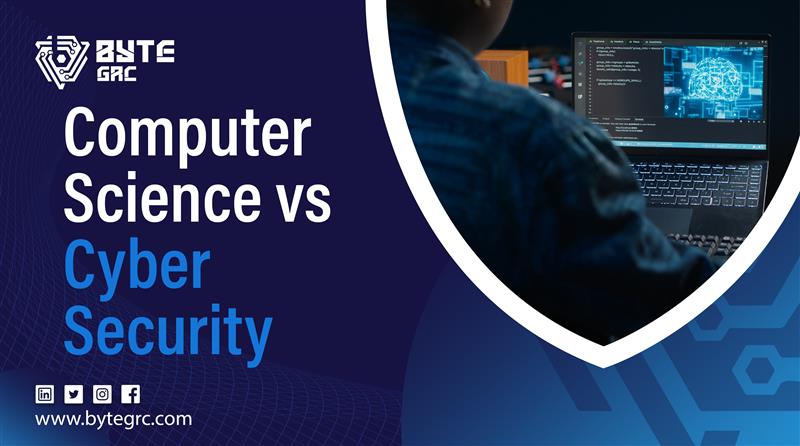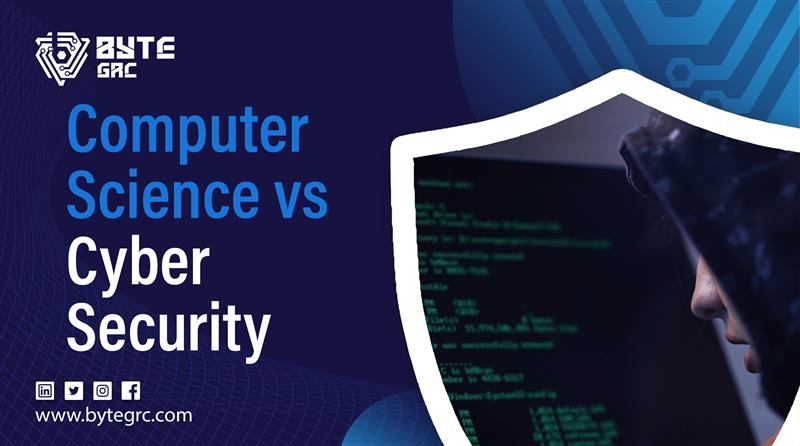|
Getting your Trinity Audio player ready...
|

Table of Contents
Computer Science vs Cyber Security: Choosing the Best Path
With the growing dependence comes a rising need for skilled professionals in tech. But one big question many students and career-changers ask is: “Should I choose Computer Science or Cyber Security?” Both of these paths offer exciting careers, solid salaries, and job stability. However, they cater to different interests, strengths, and goals.
In this blog, we’ll break down what computer science vs cyber security offers, how they compare, and help you decide which path might be right for you. We’ll also explore real-world roles, skill sets, and job outlooks to guide you in making a smart choice.
Understanding Computer Science
Computer Science is the academic discipline that studies how computers work and how to build software that solves problems. It’s a broad field that dives into the theory of computation, software engineering, algorithms, and more.
Core Areas in Computer Science
- Software development
- Data structures and algorithms
- Artificial intelligence (AI) & machine learning
- Computer programming languages (like Python, Java, C++)
- Operating systems and databases
- Cloud computing and systems engineering
- Mobile and web application software
Computer science lays the foundation for most modern technologies, from search engines to video games to digital assistants like Alexa.
Career Paths in Computer Science
If you pursue a CS degree, you’ll find diverse roles across industries:
- Software Engineer/Developer: Create application software and troubleshoot bugs.
- Data Scientist: Use statistics and data analysis to make predictions.
- AI/ML Engineer: Design smart tools that “learn” from data.
- Systems Architect: Plan the structure of complex computing systems.
- DevOps Engineer: Bridge development and IT operations.
- Game Developer: Design and program digital games.
- Research Scientist: Explore emerging technologies and publish findings.
Skills Required for Computer Science
A strong base in mathematics, logic, and computing is essential. Here’s what you’ll need to thrive:
- Programming languages (Python, Java, C++)
- Software development lifecycle knowledge
- Problem-solving and logical thinking
- Data modeling and database design
- Cloud services like Microsoft Azure
- Systems thinking and debugging
These skills help programmers and developers tackle real-world problems in tech.
Pros of a Computer Science Degree
- Wide range of career options
- High earning potential across industries
- Opportunities for innovation and startup culture
- Strong foundation for future learning or specialization
Cons of a Computer Science Degree
- Very competitive job market
- Requires consistent learning to stay current
- Some tasks may feel repetitive (like fixing software bugs)
Understanding Cyber Security
Cyber Security, also known as information security, focuses on protecting systems and data from cyberattacks, ransomware, and data breaches. It’s one of the fastest-growing fields in technology.
Cybersecurity involves more than firewalls and antivirus—it’s about strategy, risk assessment, secure communication, and staying ahead of cybercriminals in cyberspace.
Core Areas in Cyber Security
- Network security and endpoint security
- Ethical hacking and penetration testing
- Cryptography and encryption
- Digital forensics
- Risk management and compliance (e.g., CISSP, CompTIA)
Career Paths in Cyber Security
- Ethical Hacker/Penetration Tester: Legally break into systems to find weak spots
- Security Analyst: Monitor and secure an organization’s infrastructure
- Incident Responder: React to and contain breaches
- Chief Information Security Officer (CISO): Lead security strategy
- Forensic Expert: Investigate cybercrimes and trace digital footprints
- Security Architect: Design secure systems from the ground up
These roles protect data, users, and even national security.

Skills Required for Cyber Security
- Strong grasp of networking and operating systems
- Hands-on knowledge of ethical hacking
- Risk assessment and security engineering
- Familiarity with security frameworks (e.g., NIST, ISO 27001)
- Coding in Python, Bash, or PowerShell
- Legal and ethical knowledge of computer law and privacy issues
Pros of a Cyber Security Degree
- Strong demand and excellent job security
- Meaningful work that protects people and organizations
- Great pay, especially with certifications
- Roles available in both public and private sectors (e.g., National Security Agency)
Cons of a Cyber Security Degree
- You must constantly upgrade your skills and knowledge
- Job can be stressful due to pressure of preventing attacks
- Many roles require certifications like Certified Ethical Hacker (CEH) or CISSP
Computer Science vs Cyber Security: Table of Comparison
Feature | Computer Science | Cyber Security |
Focus | Software and systems development | Protecting data and systems |
Skills | Programming, problem-solving, data analysis | Security tools, encryption, risk assessment |
Career Options | Software engineer, data scientist, developer | Ethical hacker, analyst, CISO |
Certifications | Optional | Often required (e.g., CEH, CISSP) |
Demand | High | Extremely high and growing |
Stress Level | Moderate | High, especially in crisis mode |
Learning Curve | Steep, technical theory | Steep, evolving threats |
Which Path is Right for You?
Choose Computer Science When
- You enjoy coding and building software tools
- You love solving math or logic problems
- You’re interested in areas like AI or game design
- You want to explore different career paths in tech
Choose Cyber Security When
- You’re passionate about crime prevention in the digital world
- You enjoy finding flaws and fixing security holes
- You want a high-paying role that’s always in demand
- You work well under pressure and value privacy and ethics
Can You Do Both?
Absolutely! Many cyber experts begin with a Bachelor of Science in CS and specialize in security later. Skills like programming, networking, and data analysis overlap. With added certifications and project experience, you can transition smoothly into cyber security roles.
Salary and Job Outlook Comparison
According to the Bureau of Labor Statistics, both fields are growing fast—but cyber roles are booming.
Computer Science Salaries
- Software Engineer: $90K – $150K+
- Data Scientist: $100K – $160K+
- AI Engineer: $110K – $180K+
Cyber Security Salaries
- Ethical Hacker: $80K – $140K+
- Security Analyst: $70K – $120K+
- CISO: $150K – $250K+
Whether you choose software development or cyber threat intelligence, both careers offer excellent returns.
Conclusion
Choosing between Computer Science vs Cyber Security isn’t easy, but it doesn’t have to be overwhelming. If you love building technology, solving problems, or working with software, CS might be for you. If you care about security, risk management, and stopping cybercrime, cybersecurity could be your best bet.
In the end, both paths can lead to fulfilling careers that make a big impact in our digital world. Think about your strengths, interests, and long-term goals before you decide. And remember—many skills are transferable. So even if you start in one, you can shift to the other with the right training and certifications.
FAQs
1: Can I study computer science and still work in cybersecurity?
Yes! Many cybersecurity professionals have a CS background. With added certifications and security experience, it’s a smooth transition.
2: What pays more: computer science or cybersecurity?
Both pay well. However, high-level cybersecurity roles like CISO often offer higher salaries due to the responsibility involved.
3: Is cybersecurity harder than computer science?
Not necessarily—it depends on your interests. Cybersecurity is more about threat detection and protection, while CS dives into coding and theory.
4: What certifications help in cybersecurity?
Some top ones include Certified Ethical Hacker (CEH), CISSP, CompTIA Security+, and EC-Council credentials.
5: Is there job growth in both fields?
Yes! The global workforce needs more tech professionals than ever before, especially with the rise in cyberattacks and digital services.
6: Do I need to be good at math for both fields?
For CS, yes—math is key for algorithms and programming. For cybersecurity, basic math and logic are enough for most roles.
7: Can I switch from cybersecurity to computer science later?
Yes, if you build your programming skills and learn software design. Many professionals move between the two fields.
